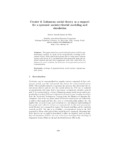Por favor, use este identificador para citar o enlazar este ítem:
http://www.alice.cnptia.embrapa.br/alice/handle/doc/1000736Registro completo de metadatos
| Campo DC | Valor | Lengua/Idioma |
|---|---|---|
| dc.contributor.author | SILVA, M. A. S. da | pt_BR |
| dc.date.accessioned | 2014-11-21T11:11:11Z | pt_BR |
| dc.date.available | 2014-11-21T11:11:11Z | pt_BR |
| dc.date.created | 2014-11-21 | pt_BR |
| dc.date.issued | 2014 | pt_BR |
| dc.identifier.citation | WORLD CONGRESS SIMULATION, 5., 2014, São Paulo. Proceedings... São Paulo, 2014. | pt_BR |
| dc.identifier.uri | http://www.alice.cnptia.embrapa.br/alice/handle/doc/1000736 | pt_BR |
| dc.description | This paper shows how a socioterritorial system could be computationally modeled by means of two social theories, Sociology of Organized Action (SOA) and Social Systems (SS) to study power relations among social actors. It is concluded that both approaches helps the empirical research and that they complement each other, while SOA emphasizes the power relations, the SS focuses on the generative process of communication. | pt_BR |
| dc.language.iso | eng | eng |
| dc.rights | openAccess | eng |
| dc.subject | Sociology of organized | pt_BR |
| dc.subject | Social systems | pt_BR |
| dc.subject | Regional analysis | pt_BR |
| dc.subject | Organização social | pt_BR |
| dc.subject | Sistema social | pt_BR |
| dc.title | Crozier & Luhmann: social theory as a support for a systemic socioterritorial modeling and simulation. | pt_BR |
| dc.type | Artigo em anais e proceedings | pt_BR |
| dc.date.updated | 2014-11-21T11:11:11Z | pt_BR |
| riaa.ainfo.id | 1000736 | pt_BR |
| riaa.ainfo.lastupdate | 2014-11-21 | pt_BR |
| dc.contributor.institution | MARCOS AURELIO SANTOS DA SILVA, CPATC. | pt_BR |
| Aparece en las colecciones: | Artigo em anais de congresso (CPATC)  | |
Ficheros en este ítem:
| Fichero | Descripción | Tamaño | Formato | |
|---|---|---|---|---|
| Marcos.pdf | 148,48 kB | Adobe PDF |  Visualizar/Abrir |









